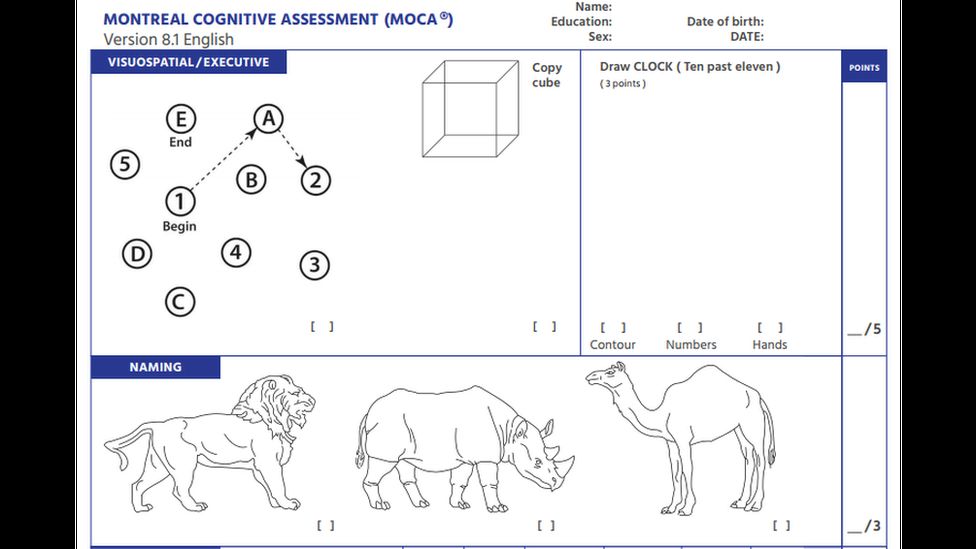

Examining the effects of formal education level on the Montreal Cognitive Assessment. If the subject answers in a concrete manner, then say only one additional time: Tell me another way in which those items are alike. Domain-specific accuracy of the Montreal Cognitive Assessment subsections in Parkinson’s disease. Test items have not been modified from the original MoCA (Nasreddine et al., 2005). Avoiding spectrum bias caused by healthy controls. Diagnostic accuracy of the Montreal Cognitive Assessment (MoCA) for cognitive screening in old age psychiatry: Determining cutoff scores in clinical practice. You can learn more about how we ensure our content is accurate and current by reading our editorial policy.

Healthline has strict sourcing guidelines and relies on peer-reviewed studies, academic research institutions, and medical associations. Further research is needed, especially to determine the best score threshold for accurate dementia diagnosis, especially in primary care settings. The authors say that the quality of the studies conducted on this topic wasn’t high enough to strongly recommend using the MoCA test for dementia diagnosis in various healthcare settings. Yet, using this cutoff also led to a significant number of incorrect results, with over 40% of people without dementia being mistakenly identified as having dementia. But other parts, like paying attention and using language, didn’t work as well.Ī 2021 review of seven studies found that, when practitioners used a score of less than 26 as a cutoff, the MoCA correctly detected more than 94% of people with dementia in different situations. The researchers found that some parts of the MoCA, like the executive function section that deals with planning and organization, were good at spotting concerns. This implies that while the MoCA can identify people needing more tests, it’s not ideal for diagnosing cognitive issues conclusively.Ī 2017 study looked at how well the MoCA works for people with Parkinson’s disease. In addition, when these results were compared to the performance of healthy individuals, the MoCA appeared to be more effective than it is in real clinical settings. Yet researchers note that its reliability for diagnosing these problems was limited. The test was able to confirm a typical ability to think and rule out severe issues like dementia. One study from 2020 assessed the MoCA’s effectiveness in detecting cognitive concerns among older adults in an outpatient mental health clinic. It appears to be particularly effective at identifying cognitive changes in individuals with higher education levels or when mild cognitive changes are the main focus of clinical attention.īut its accuracy can be influenced by factors such as the characteristics of the person being tested and the setting in which the test is administered. “There's no broad consensus that we should be giving MoCA's to people as part of their wellness examination or general annual physical,” he said.The accuracy of the MoCA test may vary depending on the specific context and population being assessed. That means the entire study guide is slim and easy-to-read.

The Montreal test is not a routine screening test in the same way a colonoscopy or a mammogram are, Honig said. The MOCA-PBR Study Guide & Test Companion covers only the topics that you need to know. “If you're looking for Alzheimer's, then you'd be reassured to say that there's no signs of that disease,” Nasreddine said, referring to a perfect score on the test. A person with a a high school education in the United States should be able to get 26 to 30, Honig said. This is because there are often confounding factors such as the level of education and whether the test is being given in the person’s native language. He has seen patients with dementia score greater than 26 and he has seen patients without dementia score below 26. Short-term memory: Ability to hear a word and repeat it back a short time later. The exam covers: Orientation: Knowing the day, date, and your present location. The 30 questions assess multiple aspects of thinking that are impacted by dementia. Lawrence Honig, a neurologist and one of the directors of the Alzheimer's Disease Research Center at Columbia University, said while the test is a pretty good indicator, it’s not perfect. Brain function is tested in the Montreal Cognitive Assessment.


 0 kommentar(er)
0 kommentar(er)
